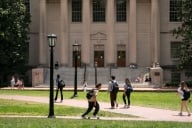You have /5 articles left.
Sign up for a free account or log in.
Tufts University has found one of its professors guilty of ethics violations during a study of vitamin-enriched rice in China, National Public Radio reported.
In a report released Tuesday, Tufts says that Guangwan Tang, associate professor of nutrition science and policy, failed to comply fully with federal regulations for research in human subjects in her study of so-called “golden rice.”
The rice, which contains high amounts of Vitamin A, is designed to treat malnutrition. But Chinese activists last year accused Tang and her Chinese partners of failing to notify parents of children involved in the study that the rice also was genetically modified. Nature reported that Chinese journalists said the information had been withheld from parents purposely because some involved in the project felt it was “too sensitive.”
Tufts says Tang will be banned from research involving human subjects for two years, followed by a two-year probation in which all human research must be overseen by a colleague.
Tang did not respond to a request for comment.
In an e-mail, a Tufts spokeswoman said that although Tang’s positive results regarding the effectiveness of golden rice in addressing malnutrition were still valid, “[w]e regret that deviations from certain approved protocols and standards occurred. Tufts has strengthened our policies and procedures to prevent recurrence of such problems, and we remain committed to conducting research of the highest quality, with rigorous oversight.”









